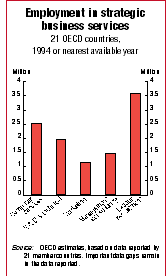|
|
|
|

Economy
Personnel wanted
by Marian Murphy

The rise in temporary employment and job mobility in OECD countries is mirrored in the rapid growth of personnel supply services. This sector provides staff on a short- or long-term basis to other sectors of the economy, mainly to deal with temporary staffing shortages. Traditionally, the sector concentrated on the supply of office and administrative staff, but nowadays, a wide range of highly skilled personnel are supplied, even company directors. One advantage for the receiving firms is that staff requirements can be managed more flexibly, increasing overall efficiency. Advantages for the temporary staff can be the flexibility and even variety in jobs and frequently higher pay, reflecting the high demand for certain skills, as well as the pressure to compensate for the fixed duration of work assignments. But there are major disadvantages too which have to be borne in mind. Firms thrive on continuity and frequent turnover of key staff can undermine core competencies of firms, particularly when they rely extensively on agency workers. Also, the high salaries paid to agency workers (plus the margins for the supplying agency) mean high costs for the firm. As for the agency workers, they have to face lower employment security than they would find in permanent employment (though this cannot be guaranteed of course). Moreover, the fragmentation of work experience can affect a person's core skills, while temporary staff often have to forego certain work-related benefits of permanent contracts, such as paid leave and company pension schemes or work-based training. Some of these disadvantages can be addressed by firms in the packages they offer, particularly at the higher skilled end of the market.
Policy too can make a difference, and to increase the benefits and limit the disadvantages of agency work, many countries, such as the Netherlands, with its recent Act on Flexibility and Security ("flexecurity"), have introduced regulations to stabilise the position of temporary workers, while maintaining flexibility for agencies and employers.